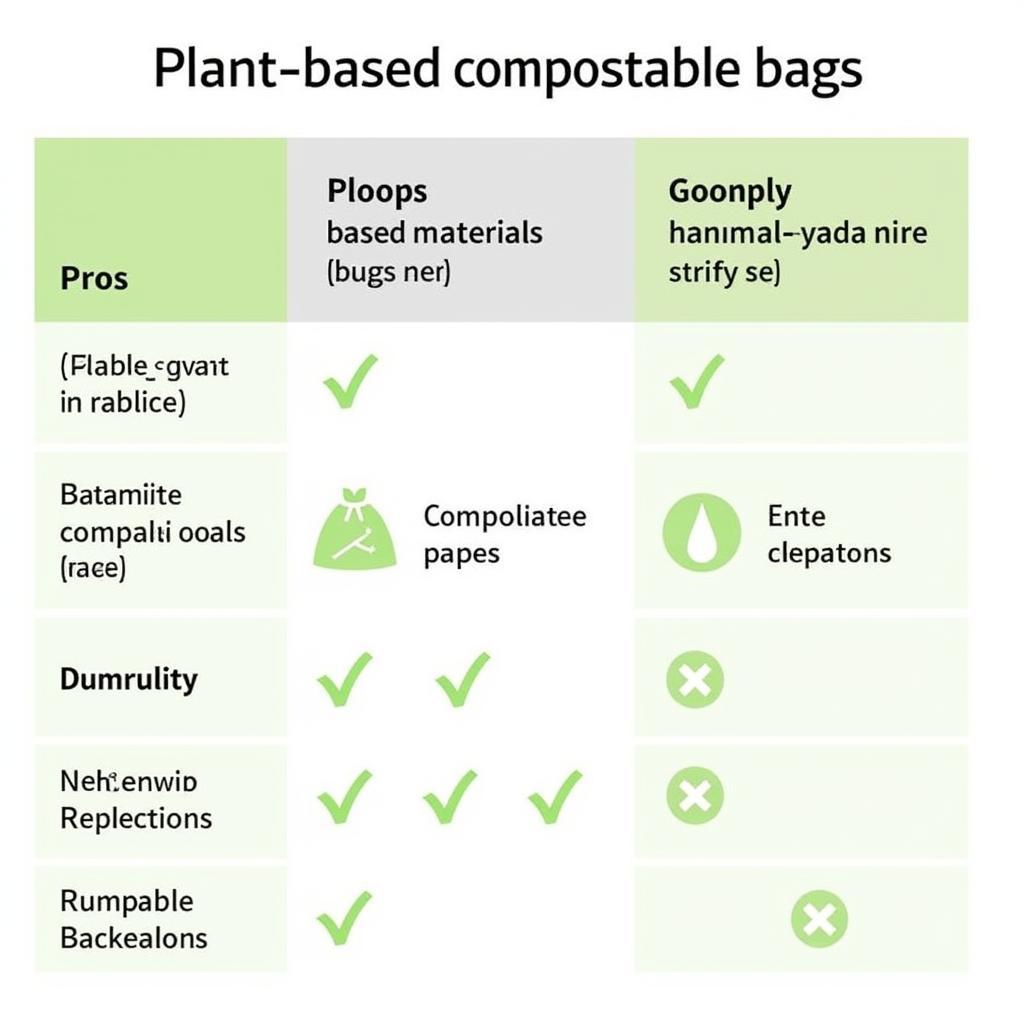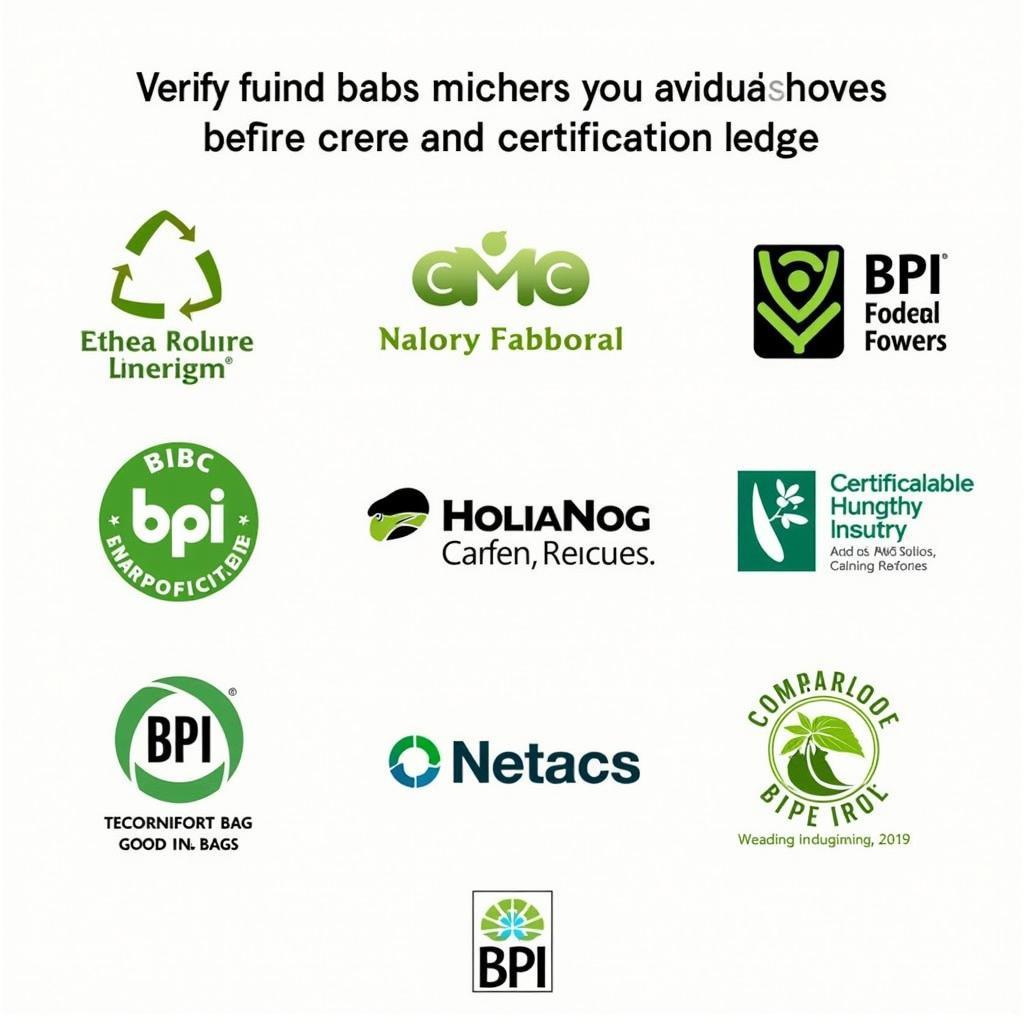Choosing the Best Compostable Food Storage Bags is more than just a trend; it’s a commitment to a healthier planet. These eco-friendly alternatives offer a sustainable solution to traditional plastic bags, reducing landfill waste and minimizing your environmental impact. But with so many options available, how do you choose the right one? This comprehensive guide will explore everything you need to know about compostable food storage bags, from their benefits and uses to choosing the best option for your needs.
Keeping food fresh and preventing waste is a universal concern. Compostable food storage bags provide a convenient and eco-conscious way to achieve this. Unlike conventional plastic bags that linger in landfills for centuries, these bags break down naturally, returning valuable nutrients to the earth. Check out our selection of food grade bags.
Why Choose Compostable Food Storage Bags?
The benefits of switching to compostable food storage bags are numerous, impacting both your personal health and the well-being of the planet. They are made from plant-based materials, reducing reliance on fossil fuels and minimizing harmful microplastic pollution. These bags are also often free from harmful chemicals commonly found in conventional plastic, making them a safer choice for storing your food. Finally, by composting these bags, you actively participate in reducing landfill waste and promoting a circular economy.
Choosing the right compostable bag is essential for effective composting. Look for certifications like BPI (Biodegradable Products Institute) which guarantees the bag will compost in a municipal or industrial composting facility. Home composting can be more challenging with some compostable bags, so ensure the bag is specifically designed for home composting if that’s your preferred method.
Navigating the World of Compostable Food Storage Bags
With a growing demand for eco-friendly alternatives, the market offers a wide variety of compostable food storage bags. They come in various sizes, thicknesses, and designs, catering to different storage needs. Some are designed for freezer storage, while others are best suited for pantry organization. Understanding these differences is crucial for selecting the best bag for your specific purpose.
Proper disposal is key to maximizing the environmental benefits of compostable bags. While they are designed to break down, they require the right composting conditions to do so effectively. Check with your local composting facility for their guidelines and accepted materials. For our range of sustainable packaging solutions, visit our page on compostable food containers.
How to Choose the Best Compostable Food Storage Bags?
Selecting the best compostable food storage bags requires careful consideration of several factors. First, determine your primary usage. Will you be freezing food, storing leftovers, or packing snacks? Next, consider the bag’s material and certifications. Look for reputable certifications that guarantee compostability. Finally, consider the bag’s size, thickness, and closure mechanism to ensure it meets your specific storage needs.
Proper storage of compostable bags is crucial for maintaining their integrity. Keep them in a cool, dry place away from direct sunlight and moisture. This will prevent premature degradation and ensure they are ready to use when needed. Looking for disposable clear containers? We have a variety of clear food storage containers disposable.
What are the different types of compostable bags available?
Compostable bags are made from various plant-based materials, each with its unique characteristics. Common materials include PLA (polylactic acid) derived from corn starch, and other plant-based starches. Each material has its strengths and weaknesses regarding durability, heat resistance, and composting speed. Understanding these differences can help you choose the most suitable material for your needs. Our wholesale packaging options might be perfect for your business. Explore our packaging for food wholesale.
 Compostable Bag Materials Comparison
Compostable Bag Materials Comparison
Are all compostable bags created equal?
Not all compostable bags are created equal. The term “biodegradable” is sometimes used interchangeably with “compostable,” but they are not the same. Biodegradable materials simply break down over time, while compostable materials require specific conditions and microorganisms to decompose fully into valuable compost. Look for certifications and clear labeling to ensure you are purchasing truly compostable bags. Need reliable food transportation solutions? Check out our food transportation containers.
 Compostable Bag Certification Logos
Compostable Bag Certification Logos
In conclusion, choosing the best compostable food storage bags is a significant step towards sustainable living. By carefully considering your needs and prioritizing certified compostable options, you can contribute to a healthier planet while enjoying the convenience and benefits of these eco-friendly alternatives.
FAQ
-
What are compostable food storage bags made of? They are typically made from plant-based materials like PLA (polylactic acid) derived from corn starch.
-
Can I compost these bags at home? Some compostable bags are designed for home composting, but others require industrial composting facilities. Check the bag’s labeling for specific instructions.
-
Are compostable bags more expensive than plastic bags? Generally, yes, but the price difference is decreasing as demand increases.
-
How long do compostable bags take to break down? The decomposition time varies depending on the material and composting conditions but can range from a few weeks to several months.
-
Can I reuse compostable food storage bags? While some bags may be reusable for a limited number of times, they are primarily designed for single use.
-
Are compostable bags as strong as plastic bags? Compostable bags are generally comparable in strength to regular plastic bags, though some variations exist depending on the specific material and thickness.
-
Where can I buy compostable food storage bags? They are increasingly available in supermarkets, health food stores, and online retailers.
Expert Insight:
“Choosing compostable bags is a simple yet impactful choice consumers can make to reduce their environmental footprint,” says Dr. Emily Carter, Environmental Scientist.
“Compostable food storage bags are not only beneficial for the environment but also offer a safer and healthier alternative to conventional plastic for food storage,” adds Maria Sanchez, Registered Dietitian.
“Look for reputable certifications to ensure your compostable bags meet industry standards for decomposition and environmental safety,” advises John Davis, Sustainability Consultant.
Need further assistance? Contact us at Phone Number: 02437655121, Email: minacones@gmail.com or visit us at 3PGH+8R9, ĐT70A, thôn Trung, Bắc Từ Liêm, Hà Nội, Việt Nam. We have a 24/7 customer service team ready to help.